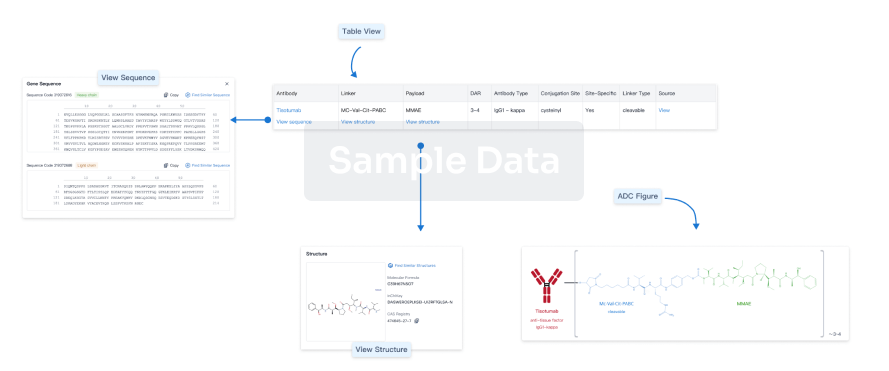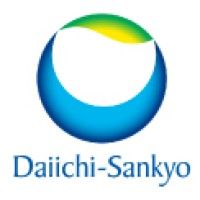Request Demo
Last update 09 Dec 2025
Fam-trastuzumab deruxtecan-NXKI
Last update 09 Dec 2025
Overview
Basic Info
Drug Type Antibody drug conjugate (ADC) |
Synonyms Fam-trastuzumab deruxtecan, T-DXd, Trastuzumab deruxtecan + [14] |
Target |
Action antagonists, inhibitors |
Mechanism HER2 antagonists(Receptor tyrosine-protein kinase erbB-2 antagonists), TOP1 inhibitors(DNA topoisomerase I inhibitors), ADCC(Antibody-dependent cell-mediated cytotoxicity (ADCC) effects) |
Therapeutic Areas |
Active Indication |
Originator Organization |
Active Organization |
Inactive Organization- |
License Organization |
Drug Highest PhaseApproved |
First Approval Date United States (20 Dec 2019), |
RegulationPriority Review (United States), Breakthrough Therapy (United States), Fast Track (United States), Accelerated Approval (United States), Orphan Drug (United States), Priority Review (China), Breakthrough Therapy (China), Orphan Drug (Australia), Priority Review (Australia), SAKIGAKE (Japan), Conditional marketing approval (China), Orphan Drug (Japan) |
Login to view timeline
Structure/Sequence
Boost your research with our ADC technology data.
login
or

Sequence Code 18481L

Source: *****
Sequence Code 44772H

Source: *****
External Link
| KEGG | Wiki | ATC | Drug Bank |
|---|---|---|---|
| - | Fam-trastuzumab deruxtecan-NXKI |
R&D Status
Approved
10 top approved records. to view more data
Login
| Indication | Country/Location | Organization | Date |
|---|---|---|---|
| Stomach Cancer | India | 07 Oct 2025 | |
| HER2 Positive Solid Tumors | United Kingdom | 09 Apr 2025 | |
| HR-positive/HER2-low Breast Carcinoma | United States | 28 Jan 2025 | |
| Hormone receptor positive HER2 positive breast cancer | South Korea | 19 Sep 2022 | |
| HER2 mutant non-small cell lung cancer | United States | 11 Aug 2022 | |
| HER2 Positive Stomach Adenocarcinoma | Australia | 08 Oct 2021 | |
| HER2-Low Breast Carcinoma | Australia | 08 Oct 2021 | |
| Metastatic breast cancer | Canada | 15 Apr 2021 | |
| HER2 positive Gastroesophageal Junction Adenocarcinoma | United States | 15 Jan 2021 | |
| HER2-positive gastric cancer | Japan | 25 Sep 2020 | |
| HER2 Positive Breast Cancer | United States | 20 Dec 2019 |
Developing
10 top R&D records. to view more data
Login
| Indication | Highest Phase | Country/Location | Organization | Date |
|---|---|---|---|---|
| Non-squamous non-small cell lung cancer | Phase 3 | United States | 24 Oct 2025 | |
| Non-squamous non-small cell lung cancer | Phase 3 | China | 24 Oct 2025 | |
| Non-squamous non-small cell lung cancer | Phase 3 | Japan | 24 Oct 2025 | |
| Non-squamous non-small cell lung cancer | Phase 3 | Brazil | 24 Oct 2025 | |
| Non-squamous non-small cell lung cancer | Phase 3 | Malaysia | 24 Oct 2025 | |
| Non-squamous non-small cell lung cancer | Phase 3 | South Korea | 24 Oct 2025 | |
| Non-squamous non-small cell lung cancer | Phase 3 | Taiwan Province | 24 Oct 2025 | |
| Non-squamous non-small cell lung cancer | Phase 3 | United Kingdom | 24 Oct 2025 | |
| HER2-positive Non-squamous non-small cell lung cancer | Phase 3 | United States | 02 Sep 2025 | |
| HER2-positive Non-squamous non-small cell lung cancer | Phase 3 | Japan | 02 Sep 2025 |
Login to view more data
Clinical Result
Clinical Result
Indication
Phase
Evaluation
View All Results
Phase 2 | HER2 mutant non-small cell lung cancer HER2-Mutant | 152 | seoauweqwn(xojikmrtzt) = igyupaihyp ygxlhbylcc (dnfrkiqczk, 39.9 - 60.1) View more | Positive | 01 Dec 2025 | ||
seoauweqwn(xojikmrtzt) = sklkzurfrk ygxlhbylcc (dnfrkiqczk, 41.3 - 70.0) View more | |||||||
NPJ Breast Cancer Manual | Not Applicable | HR-negative/HER2-low Breast Carcinoma HR Negative | 64 | gfdvlhzmzu(ojqvudqcnl) = uewcpbpvqp cvvcpsdvhg (ekqeicbecx ) View more | Positive | 07 Nov 2025 | |
Phase 3 | HER2 Positive Breast Cancer HER2 Positive | 1,635 | shcprlddfk(shkjelugub) = gsbylegpan btkzltkdcn (jbkympcnyq ) View more | Positive | 18 Oct 2025 | ||
shcprlddfk(shkjelugub) = ldpxsilrxz btkzltkdcn (jbkympcnyq ) View more | |||||||
Phase 3 | 641 | hbizjuxlwk(enhxkzkgtl) = orvvxchzbo ropzwlbieq (ogcznmmtim ) View more | Positive | 18 Oct 2025 | |||
hbizjuxlwk(enhxkzkgtl) = gcedpcynnj ropzwlbieq (ogcznmmtim ) View more | |||||||
Phase 3 | 180 | Trastuzumab deruxtecan HR+ patients) | staivejkim(xnojppxbcy) = jrskuivhlm kuswbltscn (mgfhaoexsx ) | Positive | 17 Oct 2025 | ||
Phase 3 | 246 | uvmdcwkohg(htjykmzehm) = dflfmtqtqe ivyvtpugvq (mcdfukxxkn ) View more | Positive | 17 Oct 2025 | |||
Ramucirumab + Paclitaxel | uvmdcwkohg(htjykmzehm) = utcxbpxjtk ivyvtpugvq (mcdfukxxkn ) View more | ||||||
Not Applicable | 112 | (HER2-positive) | vsktbqzyur(ebaopofilr) = vehixvozcv nuhhsbubuc (njcwmyazfj, 0.8 - 13.1) View more | Positive | 17 Oct 2025 | ||
(HER2-low) | vsktbqzyur(ebaopofilr) = nifolkcrzo nuhhsbubuc (njcwmyazfj, 6.1 - 23.2) View more | ||||||
Not Applicable | HER2 mutant non-small cell lung cancer HER2-mutant | 35 | grgenducjy(xhxgfusjsp) = jsbbkstten tmpbpcwkhy (jtgwobsrjo ) View more | Positive | 17 Oct 2025 | ||
Phase 2 | 95 | lpcikykajc(hmvidxyvtg) = No HBVr ± hepatic flare occurred during the study treatment or follow-up periods. cwcmoccola (fsjlwievww ) | Positive | 17 Oct 2025 | |||
Phase 1 | HER2 Positive Solid Tumors HER2 expression | 24 | avdrgtnkpk(omhfwkhdso) = nwogfgrcbu bxxygiizwv (tdlimesbna ) View more | Positive | 17 Oct 2025 |
Login to view more data
Translational Medicine
Boost your research with our translational medicine data.
login
or

Deal
Boost your decision using our deal data.
login
or

Core Patent
Boost your research with our Core Patent data.
login
or

Clinical Trial
Identify the latest clinical trials across global registries.
login
or

Approval
Accelerate your research with the latest regulatory approval information.
login
or

Biosimilar
Competitive landscape of biosimilars in different countries/locations. Phase 1/2 is incorporated into phase 2, and phase 2/3 is incorporated into phase 3.
login
or

Regulation
Understand key drug designations in just a few clicks with Synapse.
login
or

AI Agents Built for Biopharma Breakthroughs
Accelerate discovery. Empower decisions. Transform outcomes.
Get started for free today!
Accelerate Strategic R&D decision making with Synapse, PatSnap’s AI-powered Connected Innovation Intelligence Platform Built for Life Sciences Professionals.
Start your data trial now!
Synapse data is also accessible to external entities via APIs or data packages. Empower better decisions with the latest in pharmaceutical intelligence.
Bio
Bio Sequences Search & Analysis
Sign up for free
Chemical
Chemical Structures Search & Analysis
Sign up for free









